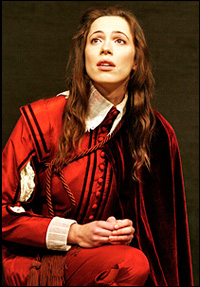
*
Once a year, we critics get to have a party. After a year of sitting in the dark, night after night, never being heard except through our written words, we get to hear our own voices and choices. At a ritzy party at the Prince of Wales Theatre, the members of the Critics' Circle give out our awards and everybody comes — the actors, the directors, the playwrights, the designers — anybody who is or could be chosen as the best of the year by those whose job it is to judge them — we critics.
Among the honored guests this year was the cast from the Best Musical, the Royal Shakespeare Company's Matilda. I was blessed to sit directly behind this row of pint-sized thespians, none older than ten. The guest speaker was the comedian Arthur Smith, not known for the delicacy of his language. To watch an entire row of tots hysterical with laughter at a grown-up speech liberally sprinkled with rude words kept me going for the entire event.
More seriously, David Suchet deservedly won his Best Actor gong for his stunning performance in Arthur Miller's All My Sons. Gracious as ever, he referred to us as "intelligent men and women going to the theatre every night with hope," which, naturally, went down well with the critical fraternity. Best Actress Jenny Jules dedicated her award to the women of the Democratic Republic of Congo that they might "live free from rape, mutilation and war," referring to the subject matter of the play for which she won her award, Lynn Nottage's Ruined. The most touching acceptance speech came from the Most Promising Playwright, Anya Reiss, who was only 17 years old when she wrote Spur of the Moment. "I wanted to be cool about this," she said through tears, "but it really matters to me."
* London is to have a new Jacobean theatre similar to Shakespeare's beloved Blackfriars Theatre, where so many of his plays — The Tempest, Cymbeline and The Winter's Tale — were premiered. The founder of Shakespeare's Globe, Sam Wanamaker, always envisaged an indoor theatre, based on a 17th-century design by Inigo Jones, alongside the famous Wooden "O," but the money wasn't there at the time the Globe was built. He insisted, though, that the space be allocated in the original building plans so that it could be developed at a later date. Now, 14 years after the Globe's opening, the new theatre will have a U-shaped, galleried auditorium embracing a platform stage and will seat 320 people, with two tiers of galleried seating and an authentic pit seating area. This will be the most complete re-creation of an English, Renaissance, indoor theatre yet attempted, but the most immediate practical advantage is that, being indoors, it will allow the Globe's productions to play through the winter.
*
 |
||
| Rebecca Hall |
||
| photo by Nobby Clark |
Also very small-scale and highly watchable is the discovery of a virtually unknown play by Terence Rattigan. New to me, Less Than Kind is actually a kind of sketch for the later Love in Idleness but, in this critic's view, a better and more serious play than the latter became in the hands of its stars, Alfred Lunt and Lynn Fontanne. This Jermyn Street production boasts a spectacularly fine performance from Sara Crowe as a woman who has to choose between her son and the man she loves. With luck and following wind, this fine play should move to the West End and across the Atlantic to Broadway.
 |
||
| Nicholas Tennant, Thusitha Jayasundera and Harvey Virdi in Tiger Country. |
||
| photo by Alastair Muir |
And on the cabaret front, Harold Sanditen's new show at The Pheasantry can't help but please those of us who've heard the old songs just too many times. This former investment banker and theatrical producer, this New Yorker who lives in London, this businessman with rage to sing, does a more than creditable job on a set of songs mostly unfamiliar even to cabaret freaks like me. Many are by songwriters whose work you know, such as Lennon and McCartney, but performed with a fresh approach. His choices are intelligent and every song tells a story. Sanditen is on his way to perform this show, Thoughts 'Round Midnight, in New York at Midtown Manhattan's Don't Tell Mama. It is well worth your time.
And, finally, those of us who regard the 2012 London Olympics with gloomy resignation are somewhat cheered by the plans of Shakespeare's Globe to produce all 38 Shakespeare plays, each in a different language — from Urdu to Greek to Maori to Mandarin — in a six-week period around the Olympics. I have this vision of the Lithuanian boxing team taking in a production of King Lear in Aboriginal on their evening off. Just the thing to set them up for a day of beating hell out of each other.
(Ruth Leon is a London and New York City arts writer and critic whose work has been seen in Playbill magazine and other publications.)
* Check out more of Playbill.com's international coverage, including London correspondent Mark Shenton's daily news reporting.











